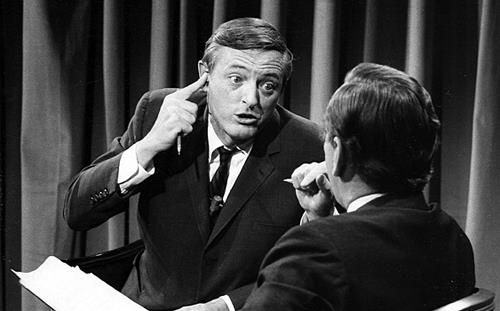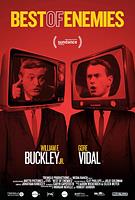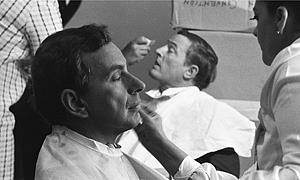
[Editor's Note: Eric Gould's review of Best of Enemies originally ran September 4, 2015, following the documentary's theatrical release.]
The recent Morton Downey, Jr. documentary helped trace the roots of conflict TV, showing how Downey’s tough-guy act paved the way for the likes of Bill O’Reilly and Sean Hannity to shill to an audience that wants a little payback and a little blood.
But Downey’s show was the moral equivalent feel of slowing down to look at a car wreck. You knew you shouldn’t be looking.
If we’re looking for the real origins of politics as TV food-fight programming, the current documentary Best of Enemies gets it right. It tells the tale of one of the most influential left-right face-offs — one that is still remembered as one of the best — for both its high level of discourse and it’s even higher echelons of insult. And it’s one that gave birth to hot-button political shows like CNN’s Crossfire and many others that have followed.
 Best of Enemies recounts the story of how conservative William F. Buckley, Jr., then editor of the National Review and former candidate for mayor of New York, came to square off on ABC during the summer of 1968 for a series of impromptu debates opposite arch-liberal Gore Vidal, himself a former congressional candidate and widely acclaimed novelist.
Best of Enemies recounts the story of how conservative William F. Buckley, Jr., then editor of the National Review and former candidate for mayor of New York, came to square off on ABC during the summer of 1968 for a series of impromptu debates opposite arch-liberal Gore Vidal, himself a former congressional candidate and widely acclaimed novelist.
(The documentary is out in theaters now if you want to go find it at your local art house. But it will likely be coming your way to television soon enough, and it’s worthwhile noting now because when it does get scheduled, you won’t want to miss it.)
The film, directed by Robert Gordon and Morgan Neville, recounts the Buckley-Vidal appearances during both the 1968 Republican National Convention in Miami and its Democratic counterpart a few weeks later in Chicago.
It was that hot summer in Chicago when the wheels finally came off in the streets outside the convention hall with helmeted police, on camera, beating and dragging young, long-haired protesters through the streets. Then they came off inside, too, with Vidal baiting Buckley as a “crypto-Nazi” and Buckley, enraged, leaning over and saying “Now listen, you queer, stop calling me a crypto-Nazi or I'll sock you in your goddamn face, and you'll stay plastered.”
That moment enshrined the Buckley-Vidal debates as one of the most refined — and one of the most vicious — with both patrician-sounding Northeast intellectuals spinning the most elaborate and eloquent political arguments the English language could muster, along with insults of the same high caliber.
Buckley, a veteran of the CIA, was two years into his 33-year run of PBS public affairs show Firing Line, which would most often have Buckley intellectually dissecting liberal politicians and advocates who would come on the show.
Vidal, (also a military veteran and an unashamed advocate of gay politics at a time when it was not conventional) was also enjoying a wide media presence at the time. He had just published the best-selling novel in America that year. Myra Breckenridge was his tale of a preoperative transgender woman who eventually returns to living as a man.
From the start in Miami, Best of Enemies has Vidal interrupting Buckley with “if there were a contest for (playing) Mr. Myra Breckenridge, you would unquestionably win it. I based her entire style polemically upon you — passionate and irrelevant.”
Vidal actually got a slight smile out of Buckley with that one, but the grinning jabs were few. Vidal was Buckley’s ideological and metaphysical opposite, hypercritical of the moneyed Republican elite, often referring to them as the worst example of “human greed” that profiteering American capitalism could produce.
 The briskly edited Best of Enemies tracks how Vidal, perhaps with malice, took the opportunity of the ABC appearances to pile up material clipped to his board to ambush Buckley, which he successfully did. (Both writers in makeup, right.)
The briskly edited Best of Enemies tracks how Vidal, perhaps with malice, took the opportunity of the ABC appearances to pile up material clipped to his board to ambush Buckley, which he successfully did. (Both writers in makeup, right.)
Together, they fashioned their own brand of a Dorothy Parker round table, fuel-injected with the incendiary politics of the times.
They’re also cited here as a kind of sideshow by fledgling ABC, at the time unable to produce the kind of lavish nightly coverage of rivals NBC and CBS, and hoping the pairing, one of the first of its kind on US television, would set them apart.
Frank Rich, former columnist for the New York Times, recounts how ABC would have rated fourth, but there were only three networks at the time. He also retells the old joke of the day that if America really wanted to end the Vietnam War, they could have just aired it on ABC and it would have been cancelled in 13 weeks.
As entertaining as Best of Enemies begins, after the Buckley meltdown the documentary is a long, serious denouement of the acrimony between the two, including their libel suit that went on for years. At its heart, it is a fascinating document of how punditry can be a lively, entertaining — and extremely informative — discussion on television about politics.
Best of Enemies also gives us an idea of the offspring of the Buckley-Vidal appearances such as the 60 Minutes “Point/Counterpoint” feature that came shortly after with Buckley colleague James J. Kilpatrick in the conservative chair and Nicholas von Hoffman taking the liberal side.
Saturday Night Live also followed up on that tone in the '70s, with Dan Aykroyd and Jane Curtin facing off on “Weekend Update” as similarly styled political antagonists, who both resorted to insult, and with Aykroyd regularly going nuclear with his now-famous barb, “Jane, you ignorant slut.”
Buckley and Vidal and “Point/Counterpoint” would eventually set the standard for conventional political tone on television and round-the-clock political partisanship we now have on MSNBC and Fox News.
Buckley, in multiple interviews, commented on what he saw coming as the popularity of the argument as the entertainment rather than the content of such shows. Jon Stewart, in his infamous appearance on Crossfire in 2005, sat between Paul Begala and Tucker Carlson accusing them of the same, scolding, and asking them to “stop hurting America” with the Crossfire trademark amped-up partisan rants.
Of course, everyone knows that if we want intelligent discussion of the issues we can find Fareed Zakaria, Sunday mornings on CNN.
We just know that we’ll be part of a considerably smaller audience.
[Below is the August 28, 1968 ABC clip of the two very eloquent commentators facing off in Chicago, with the Buckley meltdown at 10:30. You can see the trailer for Best of Enemies here. --EG]